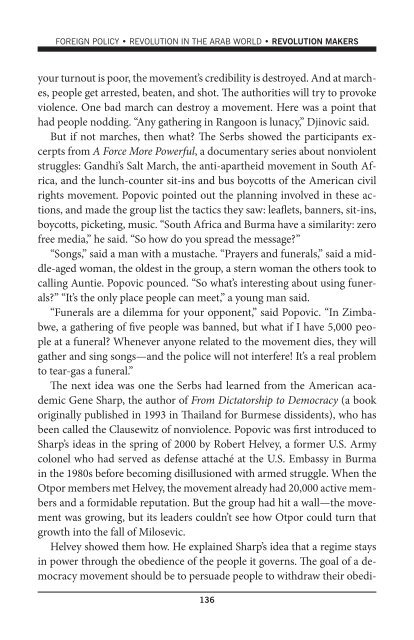Revolution in the Arab World - Observation of a lost soul Blog
Revolution in the Arab World - Observation of a lost soul Blog
Revolution in the Arab World - Observation of a lost soul Blog
Create successful ePaper yourself
Turn your PDF publications into a flip-book with our unique Google optimized e-Paper software.
foreign policy • revolution <strong>in</strong> <strong>the</strong> arab world • revolution makers<br />
your turnout is poor, <strong>the</strong> movement’s credibility is destroyed. And at marches,<br />
people get arrested, beaten, and shot. The authorities will try to provoke<br />
violence. One bad march can destroy a movement. Here was a po<strong>in</strong>t that<br />
had people nodd<strong>in</strong>g. “Any ga<strong>the</strong>r<strong>in</strong>g <strong>in</strong> Rangoon is lunacy,” Dj<strong>in</strong>ovic said.<br />
But if not marches, <strong>the</strong>n what The Serbs showed <strong>the</strong> participants excerpts<br />
from A Force More Powerful, a documentary series about nonviolent<br />
struggles: Gandhi’s Salt March, <strong>the</strong> anti-apar<strong>the</strong>id movement <strong>in</strong> South Africa,<br />
and <strong>the</strong> lunch-counter sit-<strong>in</strong>s and bus boycotts <strong>of</strong> <strong>the</strong> American civil<br />
rights movement. Popovic po<strong>in</strong>ted out <strong>the</strong> plann<strong>in</strong>g <strong>in</strong>volved <strong>in</strong> <strong>the</strong>se actions,<br />
and made <strong>the</strong> group list <strong>the</strong> tactics <strong>the</strong>y saw: leaflets, banners, sit-<strong>in</strong>s,<br />
boycotts, picket<strong>in</strong>g, music. “South Africa and Burma have a similarity: zero<br />
free media,” he said. “So how do you spread <strong>the</strong> message”<br />
“Songs,” said a man with a mustache. “Prayers and funerals,” said a middle-aged<br />
woman, <strong>the</strong> oldest <strong>in</strong> <strong>the</strong> group, a stern woman <strong>the</strong> o<strong>the</strong>rs took to<br />
call<strong>in</strong>g Auntie. Popovic pounced. “So what’s <strong>in</strong>terest<strong>in</strong>g about us<strong>in</strong>g funerals”<br />
“It’s <strong>the</strong> only place people can meet,” a young man said.<br />
“Funerals are a dilemma for your opponent,” said Popovic. “In Zimbabwe,<br />
a ga<strong>the</strong>r<strong>in</strong>g <strong>of</strong> five people was banned, but what if I have 5,000 people<br />
at a funeral Whenever anyone related to <strong>the</strong> movement dies, <strong>the</strong>y will<br />
ga<strong>the</strong>r and s<strong>in</strong>g songs—and <strong>the</strong> police will not <strong>in</strong>terfere! It’s a real problem<br />
to tear-gas a funeral.”<br />
The next idea was one <strong>the</strong> Serbs had learned from <strong>the</strong> American academic<br />
Gene Sharp, <strong>the</strong> author <strong>of</strong> From Dictatorship to Democracy (a book<br />
orig<strong>in</strong>ally published <strong>in</strong> 1993 <strong>in</strong> Thailand for Burmese dissidents), who has<br />
been called <strong>the</strong> Clausewitz <strong>of</strong> nonviolence. Popovic was first <strong>in</strong>troduced to<br />
Sharp’s ideas <strong>in</strong> <strong>the</strong> spr<strong>in</strong>g <strong>of</strong> 2000 by Robert Helvey, a former U.S. Army<br />
colonel who had served as defense attaché at <strong>the</strong> U.S. Embassy <strong>in</strong> Burma<br />
<strong>in</strong> <strong>the</strong> 1980s before becom<strong>in</strong>g disillusioned with armed struggle. When <strong>the</strong><br />
Otpor members met Helvey, <strong>the</strong> movement already had 20,000 active members<br />
and a formidable reputation. But <strong>the</strong> group had hit a wall—<strong>the</strong> movement<br />
was grow<strong>in</strong>g, but its leaders couldn’t see how Otpor could turn that<br />
growth <strong>in</strong>to <strong>the</strong> fall <strong>of</strong> Milosevic.<br />
Helvey showed <strong>the</strong>m how. He expla<strong>in</strong>ed Sharp’s idea that a regime stays<br />
<strong>in</strong> power through <strong>the</strong> obedience <strong>of</strong> <strong>the</strong> people it governs. The goal <strong>of</strong> a democracy<br />
movement should be to persuade people to withdraw <strong>the</strong>ir obedi-<br />
136




